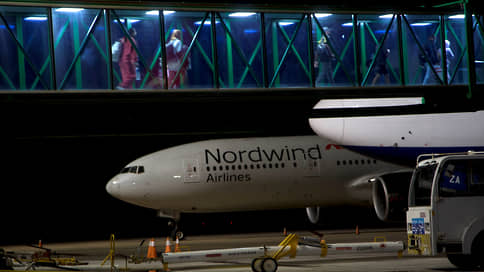NordWind ran into money – Newspaper Kommersant No. 142 (7343) of 08/08/2022
[ad_1]

As Kommersant found out, NordWind became the first carrier to pay for more than a third of the fleet left abroad. The company actively flies around the country on 23 aircraft, but will receive less than 1.4 billion rubles – five times less than it could, and less than airlines with half the size of the fleet. The reason was the reduction factor that is applied when providing an anti-sanction subsidy to companies that had more than a third of the fleet by March 21 outside the Russian Federation.
NordWind has become the only major carrier to receive five times less subsidies to support domestic traffic than it could with its flight.
Under the terms of the subsidy of 100 billion rubles, from April to October, the airline must retain at least 72% of its passenger turnover for the same period in 2021. The costs of carriers are compensated in the amount of 1.11 rubles. per passenger-kilometre.
Under this program, NordWind, which flies around the country on 23 aircraft, should receive only 1.362 billion rubles. For comparison: NordStar, which closed the top 15 airlines in 2021, with nine Boeing 737s in its fleet, will receive more than 1.433 billion rubles. Ural Airlines (fifth in the top 2021) with 52 aircraft operating flights within the country, and Utair (sixth with 30 aircraft flying within the Russian Federation, according to Flightradar24), will receive 8.9 billion and 7 billion rubles. respectively. Smartavia on 13 aircraft will provide 3.7 billion rubles, and Yakutia – 1 billion rubles. for six flying aircraft.
As one of the interlocutors in the Ministry of Transport explains, the seventh in 2021, NordWind, could receive “comparable amounts with the Urals and Utair” (up to 6 billion) “in proportion to the flight”. But, as the second source in the department specified, the company will receive payments with a reduction factor of 0.21. Decree 761 states that it applies to subsidies for those airlines that had more than a third of the fleet by March 21 “outside the Russian Federation for purposes not related to air transportation.” One of Kommersant’s sources suggests that the amendment, which did not appear in the earlier versions of the resolution, was introduced “as a warning to companies with Turkish roots for the loss of the park.”
On June 1, Reuters wrote about the dissatisfaction of the Russian aviation authorities with the losses of charter carriers – Azur Air, iFly, NordWind, Pegas Fly and Royal Flight. In a March 9 letter from Rosaviatsia, which was quoted by the agency, it was stated that “the aircraft of some operators … are at foreign airfields, including in Turkey, to be transferred to lessors under the pretext of maintenance.” In total, five airlines lost 31 aircraft, most of all – NordWind and Royal Flight (which has only two aircraft left, see Kommersant of July 17). Since the announcement of EU sanctions on February 27, NordWind has lost eight aircraft in Istanbul and two in Mexico City. In total, according to Flightradar24, out of 45 foreign aircraft that were registered with NordWind before the sanctions began, the carrier lost 17 (38% of the fleet).
The fleet of Pegas Fly, affiliated with it, consisted of 15 aircraft until the end of February, of which seven remain “on the wing” now. The remaining eight liners have remained abroad since the end of 2021 (five in Turkey).
All aircraft exported from the country since November and remaining abroad were sent for scheduled heavy maintenance, Anna Podgornaya, member of the board of directors of NordWind and CEO of Pegas Touristik, emphasized in an interview with Kommersant. She also noted that all aircraft delayed since the beginning of the sanctions were carrying out export flights, each of which was agreed with the regulator. She separately emphasized that Ramazan Akpinar (a businessman of Turkish origin, founder of the tour operator Pegas Touristik) is a citizen of the Russian Federation and the connection of two Russian airlines with Turkish ones “cannot be traced”. Comment on the declared amount of subsidies and clarify whether less than 200 million rubles is enough. for seven months on salaries in the airline, she did not, indicating only that the company “did not fire and did not send a single pilot to a simple one.”
One of Kommersant’s interlocutors in the expert community believes that the reduction factor “obviously was introduced as a warning gesture to certain companies.” In turn, Andrey Kramarenko, an expert at the Institute of Transport Economics at the Higher School of Economics, notes that he is not inclined to assess the amendments on the fleet left abroad “as the revenge of the regulators”: “This is unlikely, given the haste in which decisions were made.”
The Ministry of Transport and the Federal Air Transport Agency did not answer Kommersant’s questions.
[ad_2]
Source link





